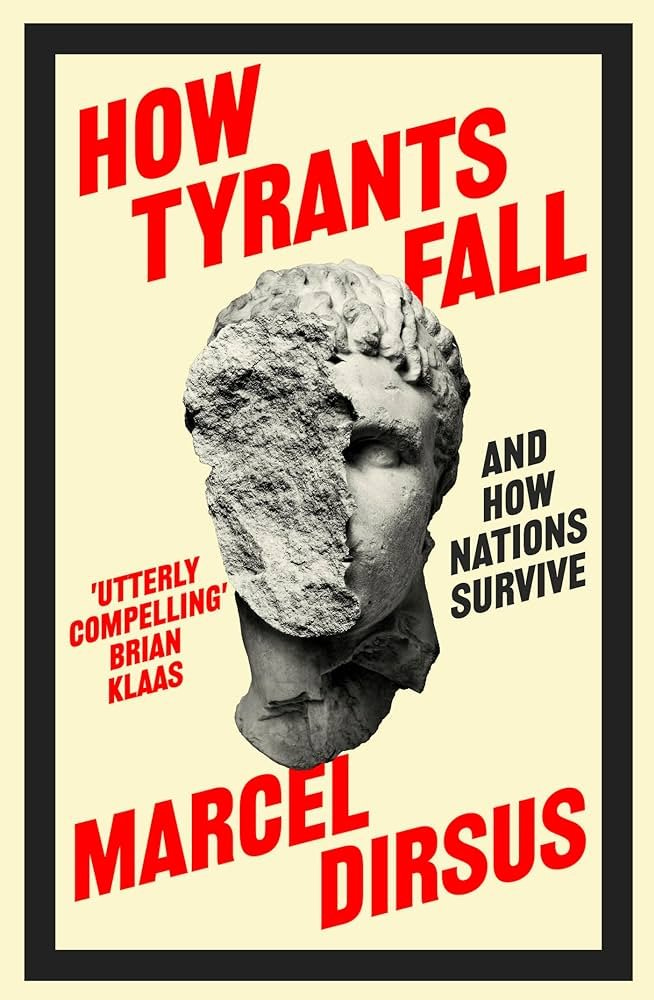Marcel Dirsus on the rise and fall of tyrants
"The tyrant usually tries to destroy as many institutions as possible because they’re constraints on his power."
🗣️ 🎤 🤯 With corporate outlets obeying in advance, supporting independent political media is more important right now than ever. Public Notice is possible thanks to paid subscribers. If you aren’t one already, please click the button below and become one to support our work. 🗣️ 🎤 🤯
As recently as a decade ago, the idea of the United States devolving into tyranny was almost unfathomable. But with Trump’s second administration assaulting constitutional checks and balances, flirting with the idea of openly defying court rulings, and waging total war on press outlets that won’t bend the knee, the prospect of America going the way of Putin’s Russia or Orbán’s Hungary is no longer farfetched at all.
Political scientist Marcel Dirsus recently wrote the acclaimed and highly recommended book “How Tyrants Fall.” As the title indicates, Dirsus details the myriad dangers autocrats face as they cling to power, but he also discusses how tyrannies become entrenched in the first place. And Dirsus says it’s time to sound the alarm about the where things are going in America.
“We are witnessing a frontal assault on America’s institutions and if it succeeds, the United States will be in serious trouble,” Dirsus told me. “Amidst the flood of headlines, it’s important to maintain perspective: While many of Trump’s policies are disagreeable, not all of them are equally damaging. But when it comes to courts and the military, everyone needs to pay attention. If judges and soldiers are neutralized or captured, democracy dies.”

I recently connected with Dirsus while he was in Hamburg, Germany, to talk about why tyranny is making a comeback throughout the world, the importance of nonviolent protest, Trumpism’s worst-case scenarios, and why he’s actually optimistic about the prospects of democracy going forward.
“If you look at things in a longer timeframe — the last 100 years instead of just the last decade — things have improved massively,” Dirsus told me. “I mean, the reason that we are even discussing this is because to many of us, democracy is now normal. It's the normal state of being for a society, and that would've been unthinkable a century ago.”
A transcript of my conversation with Dirsus, lightly edited for length and clarity, follows.
Aaron Rupar
For Americans, talking about tyranny right now is a bit disconcerting given the trajectory of Trump’s second presidency. Republicans are openly talking about him running for a third term and Trump regularly “jokes” about it too. Whether or not he’s serious, it’s a scary sign of where things are, especially in conjunction with his obviously dictatorial ambitions and actions. How worried should Americans be about our system collapsing into tyranny?
Marcel Dirsus
Trump isn’t a dictator, but there's plenty of evidence to suggest he’d like to become one. He campaigned on imprisoning his political opponents and threatening to use the justice system to go after his predecessor. He has referred to journalists as “enemies of the people,” talked about circumventing the Constitution, and expresses admiration for tyrants like Vladimir Putin and Kim Jong Un. And perhaps most importantly, he tried to sabotage the peaceful transfer of power. So the risk is very real.
The incentives for Trump are also different than for most democratic leaders because most democratic leaders leave office and perhaps spend time with their families, or make money writing books or giving speeches. But with Trump, he knows that there's a very real risk that he may not be looking forward to a tranquil retirement if he loses power.
If you conclude that Trump would like to dismantle American democracy, the question then becomes, what stands in his way?





